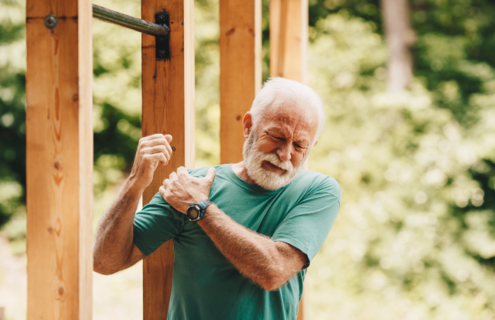
Shoulder pain is one of the most common reasons people seek orthopedic care. It’s important to know the exact cause of shoulder pain in order to address it appropriately.
Impingement syndrome is an injury often seen in student-athletes, weekend warriors, and home-improvement enthusiasts.
Cheshire Medical Center's new Director of Sports Medicine, Neal Goldenberg, MD, MA, addresses healing from this type of shoulder injury so you can get back to what you love.
What can cause shoulder pain?
In the absence of a traumatic injury such as a fall, shoulder pain is often brought on by repetitive overhead movements. This can be from a new or more intense workout regimen in the gym or starting a new sport like pickleball. Sometimes this can occur after starting a new home improvement project that requires a lot of overhead movements, such as painting a room or using a hammer.
Shoulder pain from such activities may come on slowly, or you may not notice it until after the aggravating activity (that evening or the next day). However, many will feel a deep pain in the shoulder that can travel to the outside of the upper arm or even down to the elbow. This pain is often worse with activities and can make it difficult to sleep.
What is this type of shoulder pain called and why does it happen?
We commonly refer to this as an overuse injury, but it can also lead to impingement syndrome, where the tendon of the rotator cuff gets pinched between the upper arm bone and the top of the shoulder. This can lead to inflammation of the tendon, which causes pain.
Is there a treatment for impingement syndrome?
Absolutely! Most often this type of shoulder pain resolves when you cut the cycle of inflammation. Relative rest or avoidance of painful activities, ice and anti-inflammatory pain medications can help your body reset and get back to neutral.
Relative rest means you continue to use your arm and shoulder rather than immobilizing them. However, you stop the aggravating motion for a short period of time--two weeks—although the time may vary depending on the injury and severity.
Be consistent with a regular anti-inflammatory and icing regimen whether or not you feel pain. The purpose is not only to alleviate acute pain but to lower inflammation and encourage fresh blood to the location so your body can heal.
What should you do if the pain does not go away?
If your shoulder pain does not improve, it’s important to seek medical care. Often, a physician-directed home exercise program designed to fit the patient’s individual needs and injury significantly improves shoulder pain and function.
At Cheshire, we frequently teach patients helpful exercises and send them home with resistance bands as the first step in their treatment. So patients are not sidelined from their sport or profession, we also help determine which activities they are safe to do instead to support the healing of this injury.
Patients often compensate while avoiding painful movements, which can cause overuse or tension in other muscles. We teach patients how to stretch and move to support their overall function.
Occasionally formal physical therapy with our Outpatient Rehabilitation department and potentially an injection may be required to help with pain and get you back to activities. However, proper diagnosis by an orthopedic surgeon allows the physical therapy to develop and implement the correct therapy plan.
Another important reason to seek medical care is to ensure that something more significant is not the cause of your pain, such as an injury to the rotator cuff or labrum.
Is it easy to make an appointment?
Yes. Cheshire’s Orthopaedics team prides itself on access to care. With our strong team of orthopedic surgeons and orthopedic PAs we can provide same-day access in many instances. In fact, we see most new patients referred to our office within a few days.
While we do not require a referral to see patients, many insurance companies require one to cover our services. Before you call our office, call the number on the back of your insurance card and ask if you need a referral for an orthopaedic visit. If you do, message your primary care provider via myDH and ask for a referral to our orthopeadic department. Then give us a call at 603-354-5482

Neal Goldenberg, MD, MA, orthopaedic surgeon and director of Sports Medicine at Cheshire Medical Center specializes in shoulder stabilization (open and arthroscopic), rotator cuff repair, shoulder replacement, meniscus repair and transplantation, cartilage restoration, and tendon repair.